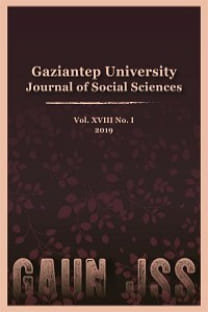The Causes of Failure Greek Minority Army in the Battle of Sakarya
Yunan Ordusu, Ankara Hükümeti’ne Sevr Antlaşması’nın imzalatılması, işgallere karşı şiddetli direnişin kırılmasını sağlamak maksadıyla İtilaf Devletleri’nin desteği ile başlattığı Ankara Harekâtı, Sakarya mevzilerinde amacına ulaşamadan büyük bir yenilgiyle sonlanmıştır. Yenilgiyle Yunan Küçük Asya Ordusunun Anadolu macerasının seyri değişmiş, o güne kadar sürekli taarruzu düşünen Yunanlı Komutanlar, Sakarya Muharebesi'nden sonra savunma harekâtına geçmişlerdir. Başarısızlığın nedenleri
dönemin askeri uzmanları tarafından savaş sonrası yazdıkları anılarda detaylı bir şekilde anlatılmışlardır. Savaş sonunda Yunanistan'da başlayan bir ayaklanma ile Sakarya Savaşı’nda başarısız olan siyasetçi ve askerler dâhil birçok kişi yargılanmış ve başta dönemin başbakanı Gunaris olmak üzere altı Yunan Bakan ve Komutan idam edilmiştir. Bu anlamda Sakarya Muharebeleri her iki ülke yöneticileri için bir dönüm noktası olmuştur. Emperyalist devletlerin çıkarları uğruna ülkelerinin geleceğini feda eden Yunan hükümetleri, yaptıkları hataların bedelini çok ağır ödemişlerdir. Diğer taraftan Türk Milleti için ise istiklalini ve istikbalini kendi azim ve kararıyla ve mücadelesiyle kurtarması sonucu, modern bir ulusun inşasında en önemli kazanımı olmuştur. Çalışmanın amacı Yunan ordusunun Sakarya Muharebeleri'ndeki yenilgisinin nedenlerini analiz etmektir. Çalışmanın konusu, Millî Mücadele döneminin en önemli muharebelerinden biri olan Sakarya Muharebesi'nin kaybedilmesinin Yunan tarihi açısından önemidir. Çalışmada Türk ve Yunan Askeri Tarih birinci el kaynaklar kullanılarak söz konusu vaka sebep-sonuç ilişkisi içinde analiz edilmiştir. Çalışma Sakarya Muharebesi dönemini kapsamaktadır.
The Causes of Failure Greek Minority Army in the Battle of Sakarya
Ankara Operation launched by the Greek Army with the support of the Entente Stateshad ended with a great defeat in the Sakarya regions without achieving its goal for signing of the Sevres Treaty by the Ankara Government and break the violent resistance against the invasions. With the defeat, the course of the Greek Asia Minor Army's Anatolian adventure had changed, Greek commanders, who had been thinking about the attack until that day, started defensive operations after the Battle of Sakarya. The reasons for the failure had explained in detail by the military experts of the period in their post-war memoirs. At the end of the war, with a rebellion that started in Greece, many people including politicians and soldiers who failed in the Sakarya War were tried and six Greek Ministers and Commanders, including the prime minister of the period Gunaris, were executed. In this sense, the Battle of Sakarya has been a turning point for the rulers of both countries. The Greek governments, who sacrificed the future of their countries for the sake of the interests of the imperialist states, paid a heavy price for the mistakes they had made. On the other hand, for the Turkish Nation, it has been the most important gain in the construction of a modern nation as a result of saving its independence and future with its own determination, decision, and struggle. The aim of the work is to analyze the causes of the defeat in the Greek Army`s Sakarya Battle. In the subject of the work is one of the most important battles of the National Struggle period the Battle of Sakarya is emphasized the importance of the loss of the Battle of Sakarya Greek History. In the study, Turkish and Greek Military History was analyzed using first-hand sources, in the context of the case-event relationship. The study covers the period of Sakarya battle.
___
- Altay, F. (1970).10 Years of war 1912-1922 and after. Istanbul: Insel Publications.
- Canakaris, V. (2007). Crying Anatolia 1919-1922. Athens: Metehmio Publications.
- Erendil, M. (1987). Sakarya Pitched Battle. Armed Forces Magazine, Vol: 106, 311,59-71.
- Greek General Staff International Military History (GGSIMH). (1967) Summarized History of the Asia Minor Expedition 1919-1922 (Unpublished Manuscript). Athens: Military History Administration Publication.
- Grigoriadis, F. (1971). History of Contemporary Greece 1909-1940. Kendrinos Publications, Volume: 2, Athens. 42-64.
- Kemal, G. M. (2016). Speech. Ankara: Fark Publications.
- Pallis, A. A. (1997). Greek Adventure in Anatolia, (Translation: Orhan Azizoğlu). Istanbul: YapıKredi Publications.
- Papoulas, A. (1969). Memoirs of General Papoulas. Istanbul: New Istanbul Publications.
- Özalp, K. (1998). National Struggle (1919-1922). Ankara: Turkish Historical Society Press.
- Stratigos, X. (1925). Greece in Asia Minor. Athens: Military Press.
- Vandemir, B. (2006). From Sakarya to Mudanya in the Turkish War of Independence, Ankara: General Staff Press.
